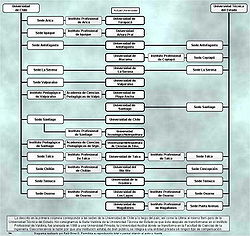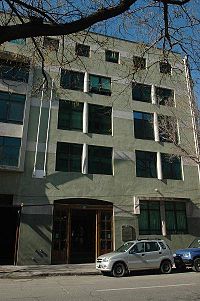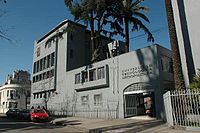Metropolitan Technological University (Chile)
The Universidad Tecnológica Metropolitana, better known by its acronym as UTEM, is a state public higher education institution in Chile, created by law on August 30, 1993., from the Professional Institute of Santiago, heir to the Academy of Technological Studies of the University of Chile in the city of Santiago, as stated in the creation of the IPS.
It is one of the eighteen universities of the Consortium of Chilean State Universities, and belongs to the Council of Rectors of Chilean Universities.
It has three campuses totaling more than seventy-two thousand square meters and offers twenty-eight undergraduate courses.
It is currently accredited by the National Accreditation Commission (CNA-Chile) for a period of 4 years (out of a maximum of 7), from September 2021 to September 2025. It ranks 30th among the Chilean universities according to the SCImago Institutions Rankings (SIR) 2022 webometric classification. It is also in position 33 according to the AméricaEconomía 2021 ranking.
History
The Metropolitan Technological University was created by law 19,239 of August 30, 1993, from the Professional Institute of Santiago (IPS), formed in 1981, when the military dictatorship separated the Academy of Sciences from the University of Chile. Technological Studies or Polytechnic Institute (IPUCH)[citation required] and other careers such as Civil Construction, Architecture, Library Science, Cartography, Social Work and Design, incorporating them into this autonomous entity.
The promulgation of Law No. 19,239 was carried out in a ceremony led by the then rector of this house of study, promoter and founder Luis Pinto Faverio, the President of the Republic Patricio Aylwin Azócar and the Minister of Education Jorge Arrate, in the Palace of La Moneda. The law was published on August 30, 1993 in the Official Gazette of the Republic of Chile.
In its beginnings, the UTEM began to teach careers in the professional area of engineering and the social area, consolidating itself as the state university that receives the largest number of young people from the first two income quintiles, from municipal and subsidized schools.
Conflicts
In 1997, the university suffered a violent year, under the management of rector Luis Pinto Faverio, who, due to these problems, lost his re-election to rectory, leaving the post to Miguel Avendaño Berríos.[citation required ] During Avendaño's administration, the Metropolitan Technological University drastically increased its monetary deficit.
Starting in 2002, the Universidad Tecnológica Metropolitana opened two careers in the field of criminalistics, at the levels of technicians (experts), graduates (scientists) and postgraduates, whose labor field would be developed in institutions such as the Carabineros de Chile, the Police of Investigations of Chile, Legal Medical Service, Chilean Army, Public Ministry, Public Criminal Defender within the new Chilean criminal procedure Reform. In 2007, the first graduates of these careers did not find ideal jobs in the market, due to the rejection of the police, who traditionally occupied this field. Added to this was the lack of resources that the State of Chile had committed to the implementation of the reform. This led to lawsuits against UTEM by graduates of both majors, making it one of the universities with the most claims in the National Consumer Service (Sernac).
At the end of 2007, the university closed the admission of criminal studies for 2008 and terminated its agreements with private entities (CELTA and EDUTEM), after its accreditation was rejected by the CNA-Chile. The university appealed to the Chilean Higher Education Council (CSE) to obtain accreditation, but the appeal was rejected.
On May 15, Miguel Ángel Avendaño submitted his resignation as rector of UTEM, becoming effective as of June 1, 2008, after which he was replaced by Haydée Gutiérrez Vilches, an academic at the institution, who handed over the position in 2009 to Luis Pinto Faverio, elected by the university academic community.
The defense of the university was assumed by the State Defense Council, being acquitted of the main lawsuit in August 2013.
Rectors
In 2021, the first elected female rector of UTEM was elected in the second round, after defeating the then rector Luis Pinto.
| Name | Period |
|---|---|
| Luis Pinto Faverio | 1993-1997 |
| Miguel Avendaño Berrios | 1997-2008 |
| Haydée Gutiérrez Vilches (s) | 2008-2009 |
| Luis Pinto Faverio | 2009-2021 |
| Marisol Durán Santis | 2021-Update |
Anthem
The hymn of the Universidad Tecnológica Metropolitana was composed by maestro Vicente Bianchi Alarcón (music) and by Rubén Campos Aragón (lyrics):
I
- About the noble pulse of the past
- and the dawn that comes from yesterday
- assumes the sun, which at the top defies,
- the morning of our work.
II
- Wonder of knowledge,
- sublime light of humanity,
- honor, glory and the value of thought,
- Salve insigne University.
III
- Go ahead, UTEM, go ahead
- with joy in her greatest flower
- we go after new horizons
- and always united by vocation.
IV
- A space of young unveiled
- looks in time his best gala
- and blind blond in wings
- while life opens its splendor.
Institutional stamps
UTEM, in accordance with its mission and vision, seeks that its graduates become committed to technological development at the service of an economically, environmentally and socially sustainable Chile.
The hallmarks of its graduates, according to the University's Educational Model, are: Technology, Social Responsibility and Sustainability.
Accreditation
In December 2010, the institution was accredited by CNA-Chile for only one year, due to persistent administrative and academic problems. Despite this, the annual report was presented in the newspaper La Nación audited, showing positive figures, thus giving clear advances in the end of its crisis.
On November 15, 2011, a study by the Chilean State Transparency Council ranked UTEM as the state university that best complied with the Government Transparency Law, with 59.53%. On 29 December of that year, the University obtained a new accreditation, this time for the period 2011-2013, returning to re-accreditation in December 2013 until December 2015. Later, after a reversal appeal presented to CNA-Chile, managed to have the progress made in the area of ties with the environment recognized, increasing its accreditation to 3 years, until December 29, 2016.
Since November 2016, the Metropolitan Technological University has been accredited for 4 years, until the end of 2020.
The UTEM, which was to undergo a new evaluation process by the CNA-Chile in 2020, had to postpone said process until the following year due to the COVID-19 pandemic.
In 2021, the UTEM was accredited again for 4 years.
Campus and infrastructure
The Metropolitan Technological University has three campuses in Santiago, reaching an approximate area of 72,902 m² of buildings and green areas.
Its largest campus, and with the largest number of students, is the Macul campus, which houses the faculties of Engineering and Natural Sciences, Mathematics and Environment. This campus is located in the Ñuñoa district, at the intersection of Avenida Grecia with Avenida José Pedro Alessandri. On this campus there are buildings of recent construction, which are mixed with the old buildings of the Hebrew Institute, which operated in that place until approximately 1980.
The Providencia campus includes a classroom building and a Dean's Office building. It is located in the commune of the same name and the Faculty of Administration and Economics works there.
In the Central Campus, located in the commune of Santiago, are the faculties of Construction Sciences and Territorial Planning and of Humanities and Social Communication Technologies, along with recently acquired buildings in the Dieciocho neighborhood, where the Central House is located.
The current Central House of the Universidad Tecnológica Metropolitana is part of the old mansions on Eighteenth Street in the city of Santiago, Chile, declared a "Typical Zone" by the country's Council of National Monuments.
The Hall of Honor of the university stands out, which is a Neo-Gothic style Chapel that has the category of "Property of Historical and Artistic Interest" and dates from the first half of the century XIX.
In July 2016, the UTEM asked the President of the Republic, Michelle Bachelet Jeria, to grant free use of the Palacio Ariztía public property, to locate the new Headquarters and the Center for Extension and Links with the Environment of the Metropolitan Technological University.
The ministries of National Assets and Public Works granted the building concession on bailment, ensuring investment in infrastructure and equipment aimed at refurbishing and recovering the property. Even though this is a long-term and long-term project Patrimonial character, when it materializes, it will allow the UTEM to have greater visibility in the city of Santiago by being located in the Alameda, like the headquarters of other universities.
Additionally, as of 2013 it begins with a series of acquisitions in order to strengthen its infrastructure. Properties are acquired in Ñuñoa, adjacent to the Macul campus, the Science and Technology Building is acquired in the San Joaquín commune, properties are acquired in Barrio Dieciocho, adjacent to the headquarters of Dieciocho 390, and in San Ignacio at the corner of Vidaurre, in addition to two buildings where the ICEL institute operated and three of the UNICIT buildings in the same neighborhood.
Organization
Rectory and Superior Council
The Chancellor is the highest unipersonal authority of the University. He is appointed by the President of the Republic.
The Superior Council is the highest collegiate body of the University. It establishes the global policies of institutional development and safeguards the fulfillment of its purposes.
It is made up of the Rector, who presides over it, three representatives of H.E. the President of the Republic, five academics from the two highest hierarchies elected by the academic body, two student representatives and one representative of non-academic officials.
Vice-rectories
UTEM has four vice-rectories, around which academic management, ties with the environment, administrative and financial management, and research are organized:
- Academic Vice-Rectory.
- Vice-rectory of Technology Transfer and Extension.
- Vice-rectory of Administration and Finance.
- Vice-rectory of Research and Postgraduate.
Programs
The programs have their own budget and resources to develop the corresponding activities. There are three programs dependent on the Rector's Office:
- Communications and Public Affairs Programme.
- Sustainability program.
- Human Rights and Citizenship Programme.
Other programs, which depend on other units are:
- Prospective and Technological Innovation Program (ProteinLab).
- Research, Development and Innovation Program (PIDi).
- Programme for Public Policy Studies (PEPP).
- Tourist Competitiveness Program.
Faculties
The Universidad Tecnológica Metropolitana is made up of five faculties, which in total offer the following 28 daytime careers and admission via the University Selection Test (PSU):
Graduate Programs
UTEM has an incipient offer of postgraduate programs, made up of seven master's degrees and one doctorate:
- Master in Nuclear Technology.
- Master in Energy Efficiency and Sustainability, mention Building.
- Master in Chemistry, mention in Materials Technology.
- Master in Public Administration
- Master in BIM Technologies
- Magyster in Biomathematics
- Master of Design in Technology and Social Innovation
- Doctorate in Materials Sciences and Process Engineering.
Technical area and others
- UTEM Technical Training Centre (CFT UTEM) (now closed)
- Public Policy Study Programme.
- Laboratory Technological Project of Envase PROTEN.
- Tactile Cartography Centre (CECAT).
Secondary education
Until 2018, the Metropolitan Technological University was in charge of the administration of six secondary schools.
- Industrial Liceo Juan Ignacio León Noguera, ex A-21
- Technical Liceo de Santiago, ex A-28
- Liceo Comercial “Osvaldo Elias Param”, ex A-99
- Commercial Liceum of Central Station, ex B-72
- Liceo Instituto Superior de Comercio Diego Portales, ex A-56
- Instituto Superior Industrial de Chillán, ex A-11
Doctors Honoris Causa
On March 20, 1996, UTEM awarded its first degree of Doctor Honoris Causa to former President of the Republic Patricio Aylwin Azócar, in recognition of his brilliant professional and academic career, and his leading role in Chilean history.
In May of that same year, UTEM awarded its second Doctorate Honoris Causa degree to doctor Edgardo Henríquez Frodden, for his outstanding professional and academic career.
The third degree of Doctor Honoris Causa was awarded to the former President of the Republic, Ricardo Lagos Escobar, on April 30, 1998 and seven years later, such a high honor was awarded to Doctor Gui Bonsiepe, renowned theoretician, industrial designer, international consultant and author of numerous must-read texts in the discipline of Design.
On May 6, 2015, the University awarded the fifth academic degree of Doctor Honoris Causa to the renowned national artist Vicente Bianchi Alarcón, due to his brilliant professional career as a scholar of music and extraordinary vocation as a pianist, composer and orchestral arranger, whose training comes from the National Conservatory of Music of Chile.
On July 18, 2018, he awarded the degree of Doctor Honoris Causa to maestro Roberto Bravo, considering his musical career, social work and dedication as an artist to the community.
On August 27, 2018, UTEM presented former President Michelle Bachelet with the title Doctor Honoris Causa, in recognition of her contribution to the development of the country, her commitment to promote public higher education and her merits in the fight for social justice and equity.







